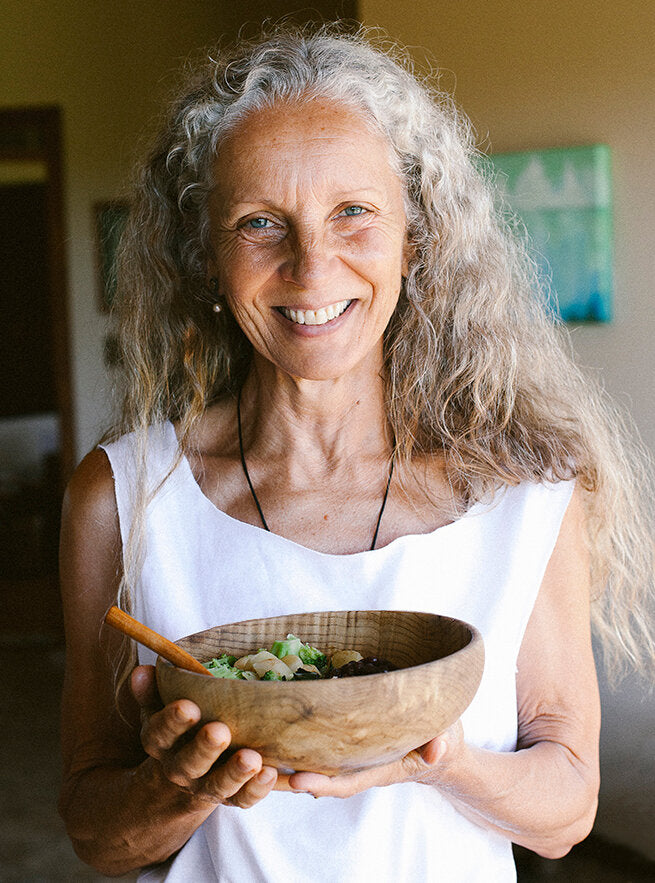
Go to your kitchen and open your pantry. Look inside your fridge and cupboards and everywhere else you store food. What you’ll likely find is enough food to last you for several months, perhaps even years.
Most of us who have access to computers or smartphones that allow us to read posts like this are not used to experiencing starvation. Yet the concept of being hungry brings up deep fear among many of my clients and students.
This trend is illustrated by a client I have been working with for several years. She had dealt with severe blood sugar fluctuations for most of her life. When she became hungry, she would feel dizzy and she feared she would pass out, though she never actually had. As a result, she had developed a tremendous fear of hunger. When I met her, she was eating about six times a day, and was emaciated, bloated and filled with fear about life. I supported her to move to eating three meals a day (and a small snack if appropriate). It only took about six months to calm her mind, ease her bloating and improve her ability to digest life. What surprised her most was that despite eating less frequently, she returned to a natural weight for her body.
Three meals a day
It’s a simple enough concept: Eat a nourishing breakfast, lunch and dinner at set times and do other things that don’t involve eating in between. Yet in our culture of snacking constantly, the idea of times to eat and times to not eat has become foreign.
Snacking between meals is a relatively new experience for our culture. In the West, it began after World War II, when food was turned from something that came from your backyard to an industrial commodity that was bought and sold on Wall Street. Industrialization brought with it many great benefits -- electric stoves, refrigeration and hot water heaters -- but it has left an sense of emptiness for those who have not turned the free time these tools have given us into meaningful action.
Eating is a sacred act of nourishing our bodies, but the industrialization and commercialization of food has turned eating into a nonstop act of consuming. People eat to satisfy emotional hunger much more often than physical. People eat because they are bored or tired or missing something in their lives. But food cannot fill these needs. As we’ve seen from the health issues that have arisen in the past several decades, reaching for food to fill the void brings excess weight and disease.
Being hungry is normal
On an emotional level, using food to soothe our pain has resulted in a deep fear of hunger among people who have never truly experienced hunger. If you cave in to the desire to eat at the moment a twinge of hunger appears, you are robbing yourself of health and well-being.
A feeling of emptiness in the belly between meals is a natural experience. It is a sign that the time to eat is coming. It takes about 6 hours to digest a full meal when digestion is good., Depending upon what was eaten and the state of agni, digestive fire this could be longer or shorter. Eating again before a meal has fully digested builds ama, metabolic toxins, and creates symptoms of indigestion that are the first step in the disease process.
The body will respond to whatever the mind believes. If you see hunger as a natural part of life and eat at regular times each day, you will be able to manage the feeling of hunger. Many of my clients do not believe this -- until they experience it themselves. They find that it is not actually so difficult to avoid snacking and they feel incredible, with more energy and easier digestion.
The spread of the Western diet and Ayurveda
I’ve seen big changes in how we approach food and eating in my lifetime. What has resulted is a rise in illness, but also many are experiencing a return to health by eating in a way that is natural for our bodies. This is what inspired me to write Freedom in Your Relationship with Food. After revising the second edition and translating it into Japanese this year, I’ve found that it’s even more important to talk about these topics now than it was a decade ago.
The Western diet, including smoothies, snacking and sugar, has spread worldwide. Yet Ayurveda is also gaining popularity all over the world. It doesn’t take very much time to experience the ill effects of the Western diet to realize that eating three meals of naturally grown food feels much better. Still, there is a lot of opportunity to build a much more positive relationship with how and what we eat. By doing this, we get in touch with our health, mental clarity and find a sense of ownership over our lives that cannot be bought or sold.
How to find balance with food
Coming to a place of balance with food is a journey worth taking. Find ways to slow down your experience with what you eat. Get rid of snack foods and fill your pantry with whole grains, legumes and spices. Take ownership over your meals by growing your own produce or simply cooking at home more often than you eat at restaurants. In the space you created, you’ll have time and clarity to examine your behaviors around hunger and eating. Here are a few patterns that you may explore:
-
Are you eating because of hunger, or something else? Many people say they are “grazers,” meaning they eat small amounts of food all day long. They eat before their body is naturally triggering them to take in food. For some, it is a desire to keep up metabolism by keeping the body in overdrive all the time. For others, such as the client I mentioned above, it is the fear of blood sugar fluctuations. But imagine if you kept your car running all day. It would quickly burn up the gas and wear out the moving parts. Consider that the same thing is happening to your body. For other people, grazing is an unconscious act. People eat because food is there, often without awareness of how much they are eating until ill health manifests. Before you take a bite of a snack, pause and breathe. What is the space you are trying to fill? Is there a better way to spend your time? How are you willing to care for your body over the urges of your mind? Take a step in a new, more fulfilling direction.
-
Are you trapped by your senses? One result of all this snacking culture is that people live life being dragged around by their senses. They are drawn to eat because food tastes good, regardless of the ingredients or whether or not it is the right thing for their constitution or state of balance. Eating to please the desires of the senses weakens the mind, making it more difficult to make decisions that are in your best interest. At the same time, examine attachments to eating food that is “good for you.” Your constitution is as unique as your fingerprints, and what is best for you might not be what the recent laboratory research reports have found to be “good.” By stepping away from diet trends, you rediscover your inner wisdom.
-
Is it a craving or a preference? A craving for food is characterized by a deep emotional pull. You may fantasize about a certain kind of food or feel strongly drawn to eat it. You may try to eat other foods to suppress the craving or even avoid being in the same room as a certain kind of food. A craving has control over your mind. A preference for food is quite different. These are softer requests that bring you closer to a state of balance, such as preferring to eat split mung instead of chickpeas. When dosha is just beginning to go out of balance, preferences appear to guide you back to center. But when dosha is far out of balance, cravings arise for foods that will push you further out of balance. If you have cravings, acknowledge them and breathe through the experience, processing any emotions that arise. Emotion is energy, and it will pass if it is allowed to pass. If you have a preference, follow that. This is your intuition working for you.
When you develop a better relationship with food, the other parts of your life begin to fall into place. You are more grounded and centered when your digestion is functioning the way it is meant to, which leads you to make decisions that are in your higher good. With each decision you make that is in your best interest, it becomes natural to grow toward the light of the divine.
No matter where you are in your life, you have the opportunity to learn what it means to feed yourself at the deepest level. When you treat eating as a sacred act, you will experience a deep level of satisfaction with every meal, and all parts of life.
